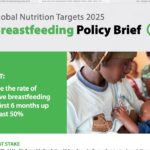Jo Smith (@josmith175) Associate Editor at Evidence-Based Nursing and Lecturer Children’s Nursing, School of Health Care, University of Leeds.
I have always been committed to teaching and promoting that patient care is underpinned by robust evidence. However, it is increasingly challenging to keep abreast of new evidence, let alone the time to appraise and consider the quality of the evidence, appraise research and consider the implications for practice: a good systematic review is often a life-line in an increasingly demanding world. One of the reasons I enjoy my role as associate editor at Evidence-Based Nursing (EBN) is that it enables me to review and consider research on a wide range of topics, and engage and debate the implications of research with experts in the field. Sharing information, through our published commentaries, networking and using social media are core to the journals objectives.
Promoting breast feeding is a global health priority http://www.who.int/topics/breastfeeding/en/ with a vast evidence base highlighting the benefits of breast feeding to provide young infants with the nutrients they need for healthy growth and development. Despite most mothers being able to breastfeed the World Heath Organisation’s 5th target is to increase the rate of exclusive breastfeed infants in the first 6 months up to at least 50%:
http://apps.who.int/iris/bitstream/10665/149022/1/WHO_NMH_NHD_14.7_eng.p df
df
A recent commentary I edited for EBN highlighted that ‘breast feeding could reduce the risk of childhood leukaemias’ (http://ebn.bmj.com/content/19/3/83.1.extract), which highlighted yet again the protective properties of breast milk. The systematic review and meta-analysis that compared no or short duration of breastfeeding with breastfeeding for 6 months or more, and childhood leukaemia (Amitay et al, 2015) found that:
- Breastfeeding reduces the risk of all childhood leukaemias; the effect is greater if feeding continued for more than 6 months.
It was a pleasure to interview Dr Colin Michie, Consultant Paediatrician, about his thoughts on the evidence and discusses issues raised in his commentary of the meta-analysis: a recommendation from the commentary was that infant feeding histories should become a central components of paediatric data, in order to identify the potential benefits of breast feeding in relation to childhood illnesses in addition to leukaemias. For more insights listen to the podcast:
Reference
Amitay EL, Keinan-Boker L. Breastfeeding and Childhood Leukemia Incidence: A Meta-analysis and Systematic Review. JAMA Pediatr. 2015 Jun;169-175.
